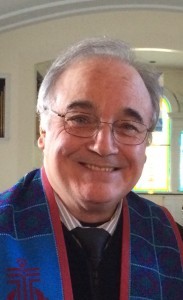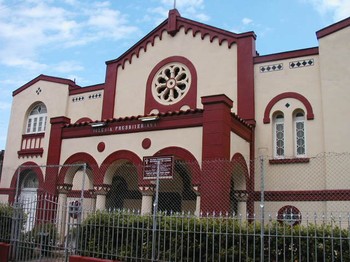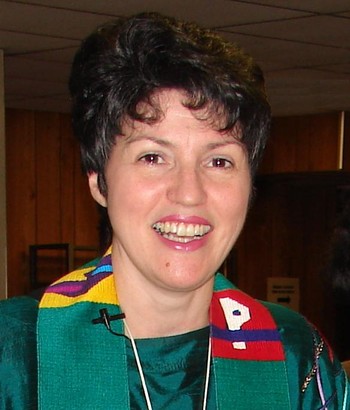Reflections in light of the renewal of relations between the United States and Cuba
 ‘Clamors for healing’
‘Clamors for healing’
by Antonio (Tony) Aja
Note: A version of this article originally appeared on ecclesio.com.
In May, Pope Francis met privately with Cuban President Raul Castro during the revolutionary’s visit to the Vatican. Announcement of their impending visit came on the heels of President Barack Obama’s declaration in December 2014 that he was seeking to renew diplomatic relations with Cuba after half a century of strife, including eventually opening embassies in Washington, DC, and Havana.
I have always advocated for the lifting of the embargo. However, I must confess I had mixed feelings about the news. I am a Cuban-born immigrant living in the United States like many others of my compatriots. While I cannot forget what my family and I went through because of the Cuban Revolution and the exilic experience, I support, as a minister of the gospel of Jesus Christ, any effort that will bring about forgiveness and reconciliation, even at the political level.
Because of my previous work with the Presbyterian Mission Agency of the Presbyterian Church (U.S.A.), I was able to visit Cuba in 2004 for the first time since I left as a teenager with some of my U.S. colleagues to engage in conversations with leaders of the Iglesia Presbiteriana-Reformada en Cuba, IPRC (Presbyterian-Reformed Church in Cuba). That gave me the opportunity to meet and befriend not only the leaders of the Cuban national church, but also many of their pastors and parishioners.
I was very impressed by all the Cuban pastors that I met during my visit, both women and men. The synergism created by the realities of daily lives and the challenges of the gospel gave way to what a prominent leader of the Cuban church described to me as “La Teología de las Cazuelas,” which loosely translated means “a Theology of Pots and Pans.” In comparison with many of us ministers and pastors in the United States who often live above the socio-economic level of our communities, these pastors preach and minister not from adorned pulpits in air-conditioned sanctuaries but from food lines, hospitals, and clinics that lack adequate medicine or equipment. There, they share in the frustrations of a people who suffer from what I consider the criminal embargo imposed by the United States on the island nation, as well as from the inadequacies of the Cuban government’s policies.
Of course, the U.S. embargo against Cuba was still in full force during my visit. I cannot help but wonder: How would the re-establishment of relations between the two countries impact the Cuban church, specifically the Presbyterian-Reformed Church in Cuba, and its relationship with its counterpart in the United States and by extension the Cuban society in general?
Some history of the relationship between the two churches may help in answering this question. Carlos Emilio Ham, a Cuban Presbyterian pastor and leader, gives us some background on how the relationship between the two Presbyterian churches began. He asserts that this genesis included a strong social and political agenda.
The Presbyterian Church was founded in Cuba by Evaristo Collazo, a Cuban lay patriot who fought against Spanish colonial rule in the 19th century. While living in Florida, USA, in political exile, he was converted to Christianity in the Reformed tradition. He returned to Cuba and founded the first Presbyterian congregation in Havana on June 26, 1890. His wife Magdalena, together with the congregation, set up a school for poor children who could not afford to pay high school fees. So from the very beginning Cuban Presbyterianism was marked by this rich heritage: patriotism and social commitment, with a strong participation of the laity and of women and a special ecumenical orientation and engagement. (“A Cuban Experience of Mission in United,” Semper Reformanda, World Alliance of Reformed Churches, vol. 52, no. 2, June 2002)
In subsequent years, the Cuban congregations were constituted as a presbytery of the Presbyterian Church USA, Synod of New Jersey, until the Cuban Presbyterian Church became an independent national church in 1977.

Iglesia Presbiteriana de Luyanó, where Dora Arce-Valentin pastored for several years
Prompted by my request to share her perspective on the changes, Dora Arce-Valentin, executive secretary for justice and partnership for the World Communion of Reformed Churches and a minister member of the IPRC, writes: “Since 1977 when the IPRC became autonomous, the relationships with what is today the PC(USA), have been fraternal, respectful and in solidarity.” She further shares that:
Therefore, I consider that [in] any systematization of the history of the relationship between Cuba and the U.S.A. of the last fifty-five years, the role of the churches in the normalization of this relationship will have to be singled out due to its paradigmatic prophetic and “evangelical” character.
In other words, she believes that the churches in both Cuba and the United States may have served as the preamble of the current effort to develop the political apertures between the two countries. Moreover, she hopes that the new policies will
[ . . . ] open new opportunities of interchange of experiences, more possibilities for dialogue regarding the mission of the church, and even the working together of the two churches to address injustice in both contexts.
I also asked Cuban exiled colleagues to share their opinions. Magdalena I. Garcia, a PC(USA) minister who also migrated to the United States at a young age, writes the following:
When I heard about President Obama’s initiative to restore relations with Cuba, I was overjoyed. I immediately uploaded an NPR story to my Facebook wall with the following introduction, ‘It was about time. Thank you, Mr. President.’ That was the beginning of many days of reading and posting reactions to the announcement from various voices and media around the world, both in favor and against Obama’s initiative, and the end of my Facebook friendship with some of my own cousins in the US! The historic revolution of 1959 and its ensuing chapters—many of which have glorious social accomplishments along with nefarious footnotes on human rights violations—are an open, bleeding wound for all Cuban families on both sides of the Florida Straits, but one that clamors for healing.

Magdalena I. García is a PC(USA) teaching elder and a hospice chaplain for Vitas Healthcare in Chicago.
Those wounds to which Garcia refers are still deeply embedded in the minds of some Cubans in the United States. Prominent anti-Castro leader Martin Añorga, a Presbyterian pastor who has lived in Miami, Florida, since the early 1960s, expressed to me his point of view on the situation in Cuba:
Inside the Island the future of the church depends entirely on the government. The Revolution took away from the churches the right to have private schools and to maintain ministries related to healthcare. The Cuban government also prevents the church access to the public media. As long as these norms continue, there will not be a substantial beneficial change for the proclamation of the Gospel in Cuba.
Another Cuban exile warns of the danger of seeing the current normalization of relations between the two countries from only a religious point of view. Jose Luis Casal, general missioner of the Presbytery of Tres Rios in Texas, writes the following:
To limit the discussion to a religious context is just to generalize and spiritualize the dialogue leaving out of consideration the complexity of the social fabric of the Cuban society. If the Church in Cuba and in the United States wants to be a factor of influence, it has to accept the challenge and risk to address the problems of the Cuban society with the language of the society and abandon the religious jargon. The religious language many times is used to preserve the status and privileges of the church, but the spirit of the gospel goes beyond a particular language and transcends particular structures to incarnate in the society.
Personally, I would like to see the church of both countries continue to live up to their commitment to justice and peace. Most agree that, in spite of both the embargo and the policies of the Cuban government, many of the social gains of the revolution deserve to continue in full force. Universal healthcare and education for all the Cuban people, for example, should be lauded and supported by the U.S. church.
Moreover, if any political changes take place, it should be up to the Cuban people and on their own terms. There I would like to see the U.S. church opposing any type of overt intrusion from the part of the United States. At the same time, efforts to “invade” Cuba with the ills of unchecked capitalism and economic globalization should also be opposed by the church in North America.
Regardless, the gospel principles of reconciliation and forgiveness should guide the process. May the God of love and justice, whose reach transcends even the church, reign once again in this effort to bring about peace between the two countries.
Antonio (Tony) Aja is a teaching elder member of the Presbytery of Santa Fe in the Presbyterian Church (U.S.A.) and currently serves as pastor of Westminster Presbyterian Church in Santa Fe, New Mexico. He earned a Doctor of Ministry degree at McCormick Theological Seminary. A former refugee from Cuba, Tony has developed new ministries with refugees and immigrants in Florida and Kentucky. He has been a missionary, pastor, executive director of an ecumenical ministry, and staff at the PC(USA) national headquarters.